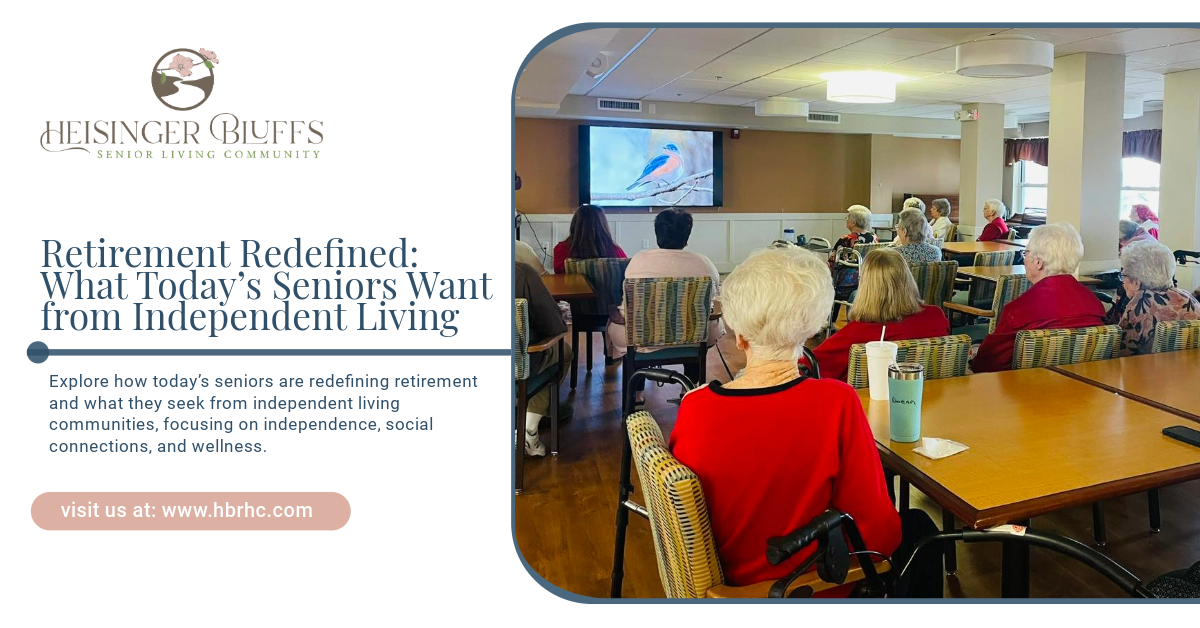Preventative Health Screenings in Senior Living Communities

As we age, our health needs become more complex, and maintaining a proactive approach to well-being becomes even more important. For seniors, the value of preventative health screenings cannot be overstated. These screenings play a critical role in detecting potential health issues early, when they are most treatable, and in preventing serious conditions from developing or worsening. For seniors residing in senior living communities, regular health screenings are an essential part of maintaining health and quality of life.
Preventative health screenings not only help in identifying risks but also empower seniors and their caregivers to take action before a health issue becomes more severe. In this blog post, we will explore the types of preventative health screenings commonly offered in senior living communities, their benefits, and why they are essential for aging adults.
What Are Preventative Health Screenings?
Preventative health screenings are medical tests or exams used to detect potential health problems before they become symptomatic or more advanced. These screenings can identify conditions that may not have noticeable signs or symptoms in their early stages. By catching these issues early, seniors can undergo treatments that may prevent complications or even improve their overall health.
Common preventative screenings include tests for cancer, heart disease, diabetes, and other chronic conditions that often affect older adults. These screenings aim to provide seniors with the necessary information to manage their health proactively.
The Role of Preventative Health Screenings in Senior Communities
Senior living communities provide a structured and supportive environment for older adults to receive regular health checkups and preventative screenings. Regular screenings help seniors stay on top of their health, especially as they may face multiple health challenges or age-related changes.
In addition to ensuring that residents receive the right tests at the right time, senior communities often have healthcare professionals on hand to monitor seniors’ overall well-being. With easy access to medical professionals and regular checkups, seniors are more likely to receive the attention they need to maintain good health.
Here are some of the most common types of preventative health screenings offered in senior living communities.
Key Preventative Health Screenings for Seniors
1. Blood Pressure Screening
High blood pressure (hypertension) is a common condition among older adults and is often referred to as the "silent killer" because it may not present symptoms until it's too late. Regular blood pressure screenings are essential for detecting high blood pressure early. Left untreated, hypertension can lead to heart disease, stroke, kidney failure, and other severe health conditions. Seniors should have their blood pressure checked regularly to help prevent these complications.
2. Cholesterol and Lipid Panel
Cholesterol levels are another key indicator of heart health. Elevated cholesterol, especially LDL ("bad" cholesterol), can contribute to the buildup of plaque in the arteries, leading to heart disease and stroke. A cholesterol screening, also known as a lipid panel, measures levels of cholesterol and triglycerides in the blood. Seniors should have their cholesterol levels monitored regularly, as they are at an increased risk for cardiovascular conditions.
3. Diabetes Screening
Diabetes is another common chronic condition affecting seniors, especially those over the age of 65. High blood sugar can lead to complications such as nerve damage, heart disease, and vision problems. A simple blood test can detect whether blood sugar levels are elevated, and early diagnosis is essential for managing the condition. Regular screenings help seniors prevent or delay the onset of type 2 diabetes.
4. Cancer Screenings
Cancer is a leading cause of death in older adults, and certain cancers become more prevalent with age. There are several types of cancer screenings that seniors should consider as part of their preventative health care:
- Breast cancer: Mammograms are recommended for women starting at age 50 and continuing every two years, depending on individual risk factors.
- Prostate cancer: Men should discuss prostate cancer screening with their healthcare providers, as some may benefit from early testing, especially those with a family history of the disease.
- Colorectal cancer: Colonoscopies are recommended for both men and women at age 50, or earlier if there’s a family history of colorectal cancer.
- Skin cancer: Regular skin exams by a healthcare professional are critical for detecting skin cancer, especially for seniors with a history of sun exposure or a family history of skin cancer.
Cancer screenings allow for early detection, which significantly improves treatment outcomes and survival rates.
5. Vision and Hearing Tests
Seniors are at a higher risk of developing vision and hearing impairments, which can significantly impact their quality of life. Regular eye exams help detect conditions such as cataracts, glaucoma, and macular degeneration, which can lead to blindness if left untreated. Hearing tests are equally important to identify age-related hearing loss, a common condition in older adults that can affect communication and overall well-being.
By receiving routine vision and hearing tests, seniors can address problems early and take appropriate measures, such as corrective lenses or hearing aids, to maintain independence and improve their daily functioning.
6. Bone Density Screening
Osteoporosis is a condition that causes bones to become fragile and prone to fractures. Seniors, especially postmenopausal women, are at increased risk of osteoporosis. A bone density test, also known as a DEXA scan, measures bone strength and can identify osteoporosis before fractures occur. Early detection of low bone density allows for lifestyle adjustments, medication, and other treatments to prevent fractures and maintain mobility.
7. Mental Health Screenings
Mental health is just as important as physical health, especially for seniors. Depression, anxiety, and cognitive decline (including dementia and Alzheimer’s disease) are common among aging adults. Mental health screenings, such as the Geriatric Depression Scale (GDS) or memory tests, can help identify early signs of mental health issues. Seniors who are diagnosed early can benefit from therapies, medications, and other interventions that improve their emotional well-being and cognitive function.
The Benefits of Preventative Health Screenings for Seniors
1. Early Detection of Health Issues
The primary benefit of preventative health screenings is the early detection of potential health problems. Many chronic conditions, such as heart disease, diabetes, and cancer, don’t present obvious symptoms until they reach more advanced stages. Detecting these issues early can significantly improve treatment outcomes, reduce the risk of complications, and even save lives.
2. Improved Quality of Life
Preventative health screenings can help seniors maintain a higher quality of life by enabling them to address health concerns before they become serious. Early detection of conditions like hearing loss, vision impairment, or cognitive decline can help seniors retain their independence and continue to engage in daily activities. Timely treatment for physical or mental health conditions can also help seniors feel more comfortable and empowered in their daily lives.
3. Cost Savings
Preventative health screenings can also help save money in the long term. By detecting health issues early, seniors may avoid expensive hospitalizations, surgeries, and long-term care. Preventing severe health issues from developing can also reduce the need for extensive treatments and interventions, which can be financially burdensome for seniors and their families.
4. Better Communication Between Healthcare Providers
In senior living communities, healthcare providers work together to coordinate care and ensure that seniors receive consistent, comprehensive treatment. Regular preventative screenings allow healthcare professionals to track a senior's health over time, identify trends, and collaborate to provide the best possible care.
Why Senior Living Communities Are Ideal for Preventative Health Screenings
Senior living communities are ideal settings for receiving regular preventative health screenings due to their structured environment and access to healthcare professionals. These communities typically have on-site medical staff, including nurses, doctors, and therapists, who are available to monitor residents' health, schedule screenings, and provide ongoing care.
Additionally, many senior living communities offer wellness programs and health clinics that provide residents with easy access to a range of health screenings, ensuring that they stay on top of their health needs. The collaborative approach within these communities means that seniors receive consistent and thorough care, which is crucial for aging adults.
Conclusion
Preventative health screenings play a vital role in helping seniors stay healthy, independent, and active. Regular screenings help detect health issues early, allowing for prompt intervention and reducing the risk of more severe complications. By offering access to comprehensive screenings, senior living communities ensure that residents receive the care and attention they need to age gracefully.
At Heisinger Bluffs, we understand the importance of preventative health care for seniors. Our community is dedicated to providing residents with regular health screenings and personalized care to help them maintain their well-being and enjoy a high quality of life.
Frequently Asked Questions
How often should seniors undergo preventative health screenings?
The frequency of health screenings depends on the individual’s age, medical history, and risk factors. Generally, seniors should have regular checkups annually and screenings such as cholesterol, blood pressure, and diabetes tests at least once a year.
Are preventative health screenings covered by insurance in senior living communities?
Many insurance plans, including Medicare, cover the cost of routine preventative health screenings. It’s best to check with the insurance provider to confirm coverage details.
What should seniors do if a screening identifies a health issue?
If a screening identifies a potential health issue, seniors should consult with their healthcare provider for further testing, diagnosis, and treatment options. Early intervention can significantly improve the outcome of many health conditions.
Sources:
- https://www.healthcare.gov/coverage/preventive-care-benefits/
- https://www.nia.nih.gov/health/high-blood-pressure/high-blood-pressure-and-older-adults
- https://www.hopkinsmedicine.org/health/conditions-and-diseases/high-cholesterol/older-adults-and-high-cholesterol-what-you-need-to-know
- https://www.uchicagomedicine.org/forefront/health-and-wellness-articles/2024/april/diabetes-older-adults
- https://www.webmd.com/healthy-aging/the-most-common-cancers-in-older-adults











